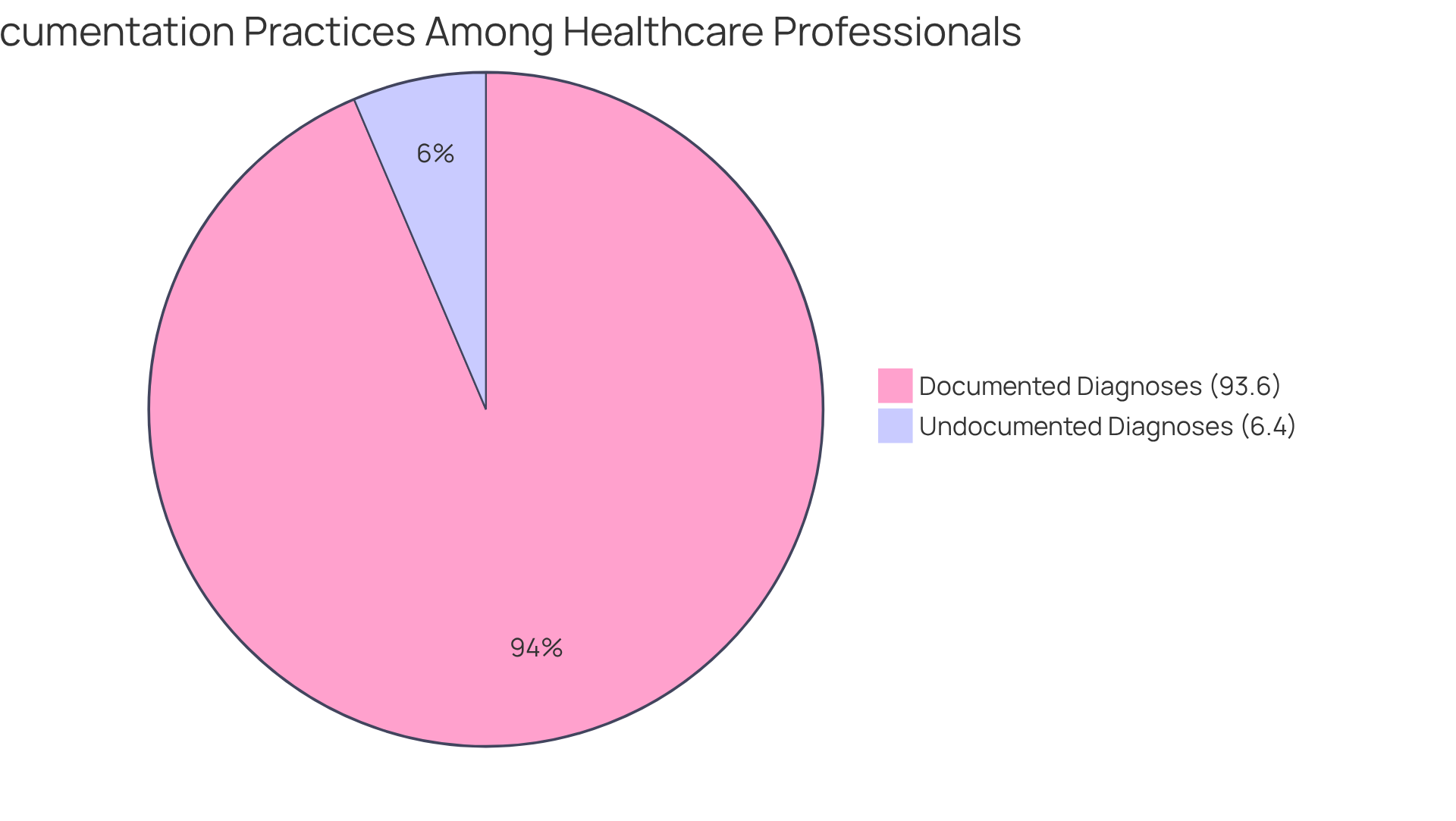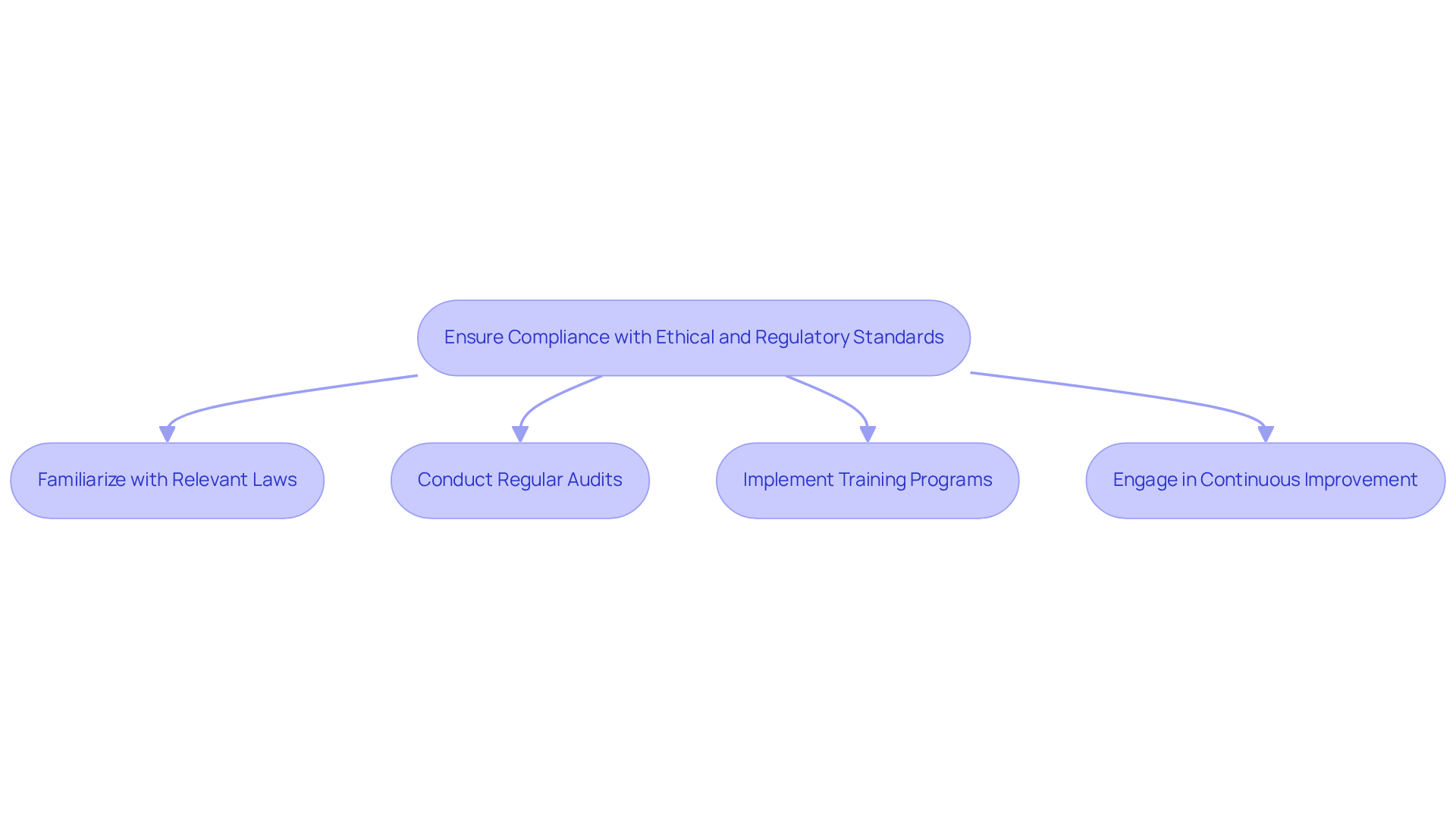Overview
In the demanding world of healthcare, providers often face overwhelming emotional challenges. The burden of managing extensive documentation can detract from their primary focus: patient care. To alleviate these pressures, three key strategies can be implemented for effective healthcare notes management.
-
Utilizing standardized templates can streamline the documentation process. This approach not only saves time but also enhances the quality of records, ensuring that vital information is captured accurately. Have you ever felt the frustration of sifting through inconsistent notes? Standardization can offer a clear path forward.
-
Incorporating technology plays a crucial role in modernizing documentation practices. By leveraging electronic health records and other digital tools, healthcare providers can reduce administrative burdens significantly. Imagine the relief of having intuitive systems that support rather than hinder your workflow.
-
Training staff on best practices fosters a culture of excellence in documentation. Empowering team members with knowledge ensures compliance with ethical and regulatory standards, ultimately leading to improved patient care and outcomes. Isn’t it comforting to know that there are ways to enhance both your efficiency and the quality of care you provide?
These strategies not only ease the documentation process but also create a more supportive environment for both healthcare providers and patients. By embracing these solutions, we can work together to improve the healthcare experience for everyone involved. Let’s take these steps towards a brighter, more efficient future in patient care.
Introduction
In the ever-evolving landscape of healthcare, the importance of precise documentation is truly profound. Accurate healthcare notes not only enhance patient outcomes but also act as essential legal safeguards, ensuring that care remains both compassionate and compliant with ethical standards. However, many healthcare providers face emotional challenges due to overwhelming documentation demands. How can they effectively manage these processes to ease their burdens and improve care delivery?
This article explores three key strategies that promise to transform healthcare notes management. By fostering an environment where both providers and patients can thrive, we can alleviate some of the stress associated with documentation. Let’s delve into these solutions together, recognizing the shared experiences in our journey toward better healthcare.
Understand the Importance of Accurate Healthcare Documentation
Precise healthcare notes are vital for healthcare providers and their patients. It not only creates thorough healthcare notes for each individual but also plays a crucial role in informed clinical decision-making and effective communication among medical professionals. Have you ever considered how well-documented records can significantly enhance patient outcomes? Research shows that when all relevant healthcare notes are accessible, interactions with individuals improve, resulting in better care. In fact, 93.6% of medical professionals have completely recorded client diagnoses, which directly relates to improved treatment planning and continuity of care.
Moreover, accurate healthcare notes serve as essential legal safeguards, acting as proof of the care provided and the decisions made. In the context of Catholic medical services, maintaining precise records aligns with ethical principles, ensuring that care is not only compassionate but also adheres to moral standards. This commitment to comprehensive healthcare notes not only enhances patient safety but also strengthens the integrity of medical practices. As healthcare providers, embracing this dedication can lead to a more nurturing environment for both patients and professionals alike.

Implement Effective Documentation Strategies
To implement effective documentation strategies, healthcare providers encounter emotional challenges that can affect healthcare notes and ultimately impact patient care. Consider the following best practices to alleviate these burdens and enhance the quality of care:
- Utilize Templates and Standardized Forms: Standardized templates simplify the record-keeping process, ensuring that all necessary information is captured consistently. Research suggests that organized records of healthcare notes significantly enhance the quality of clinical notes, with an average quality score increase from 64.35 to 77.2 following implementation. This method not only improves clarity but also decreases variability in quality among providers, ultimately promoting better care and addressing the issues of fragmented care systems by utilizing healthcare notes.
- Incorporate Technology: Leveraging tools such as electronic health records (EHRs) and AI-driven documentation solutions can automate routine tasks, significantly reducing the administrative burden on providers and helping to alleviate physician burnout. For example, CosmaNeura's AI platform improves medical service delivery by automating administrative tasks, optimizing billing, and offering diagnostic assistance. This enables clinicians to concentrate more on care for individuals. Organizations using CosmaNeura have reported significant time savings for clinicians and increased revenue through optimized billing. This integration of technology not only improves efficiency but also enhances the overall quality of patient interactions, addressing key challenges found in healthcare notes delivery.
- Train Staff on Best Practices: Regular training sessions are essential for staff to understand the significance of precise records and to familiarize them with the tools available. Organizations that introduce organized analytics training programs attain 47% greater user adoption rates, resulting in quicker compliance advantages and enhanced record-keeping methods. This can assist in alleviating the impacts of physician burnout.
- Encourage Real-Time Documentation: Recording interactions with individuals right after they happen reduces mistakes and omissions, guaranteeing that records are as precise as possible. This practice aligns with the principle that 'if it's not written, it didn't happen,' highlighting the legal and clinical significance of comprehensive records.
By adopting these strategies, healthcare providers can enhance the quality and efficiency of their healthcare notes documentation processes. This ultimately transforms healthcare delivery and improves outcomes for individuals, fostering a supportive environment that prioritizes both provider well-being and patient care.
Ensure Compliance with Ethical and Regulatory Standards
Ensuring compliance with ethical and regulatory standards can feel overwhelming for healthcare providers when managing healthcare notes. It's essential to recognize the emotional challenges that come with navigating complex laws and maintaining patient trust. By taking proactive steps, you can alleviate some of these burdens and focus on what truly matters—caring for your patients.
- Familiarize with Relevant Laws: Staying informed about laws such as HIPAA is vital for safeguarding individual privacy and data security. Understanding these regulations not only helps maintain compliance but also safeguards the sensitive healthcare notes of those you serve.
- Conduct Regular Audits: Regular evaluations of your record-keeping methods are crucial for identifying areas for improvement. These audits can reveal weaknesses, allowing you to implement corrective actions that enhance both operational efficiency and compliance efforts. In fact, organizations that routinely perform audits often see significant improvements in their record accuracy and adherence to ethical standards. Remember, the typical cost of data breaches in healthcare was $9.3 million per occurrence in 2021—an urgent reminder of the financial implications of inadequate record-keeping.
- Implement Training Programs: Continuous learning about ethical record-keeping practices empowers your staff to uphold high standards. Training should emphasize the importance of precise record-keeping, the repercussions of non-compliance, and best practices for protecting patient information. Regular training sessions reinforce the significance of ethical standards, fostering a culture of accountability.
- Engage in Continuous Improvement: Creating an environment of ongoing enhancement encourages healthcare providers to regularly assess and refine their record-keeping methods. This proactive approach not only ensures compliance with ethical and regulatory requirements but also nurtures a commitment to high-quality patient care. By integrating feedback from audits and training into your daily operations, you can adapt to evolving standards and enhance your documentation practices. As Marc Haskelson, President and CEO of Compliancy Group, emphasizes, being prepared for healthcare breaches is essential. Regular audits play a critical role in this preparation of healthcare notes, ensuring you are equipped to protect your patients and your practice.

Conclusion
Accurate healthcare documentation is not merely a regulatory requirement; it stands as a cornerstone of effective patient care. By prioritizing precise and thorough healthcare notes, providers can significantly enhance clinical decision-making, improve communication among professionals, and ultimately lead to better patient outcomes. This commitment to high standards in documentation fosters an environment where care is both compassionate and ethical, aligning with the core values of the healthcare profession.
The article emphasizes three key strategies for effective healthcare notes management:
- Utilizing standardized templates
- Incorporating technology
- Ensuring staff training
These approaches not only streamline the documentation process but also alleviate the emotional burdens faced by healthcare providers. By adopting these best practices, organizations can enhance the quality and efficiency of their documentation, which is crucial for maintaining compliance with ethical and regulatory standards.
In conclusion, the significance of accurate healthcare documentation cannot be overstated. It is essential for safeguarding patient information, improving care delivery, and ensuring compliance with regulations. Healthcare providers are encouraged to embrace these strategies to create a supportive environment that benefits both patients and professionals. By prioritizing effective documentation practices, the healthcare community can navigate the complexities of modern care with confidence and compassion, ultimately leading to a healthier future for all.




